Top Related Projects
Nodejs extension host for vim & neovim, load extensions like VSCode and host language servers.
A completion plugin for neovim coded in Lua.
A code-completion engine for Vim
async language server protocol plugin for vim and neovim
Quick Overview
Deoplete.nvim is a powerful asynchronous completion framework for Neovim. It provides fast, extensible, and context-aware auto-completion functionality, enhancing the coding experience for Neovim users.
Pros
- Asynchronous completion, ensuring smooth performance
- Extensive plugin ecosystem for various languages and frameworks
- Highly customizable with numerous configuration options
- Supports multiple sources for completion suggestions
Cons
- Requires Neovim (not compatible with standard Vim)
- Can be complex to set up and configure for optimal performance
- May have a steeper learning curve compared to simpler completion plugins
- Occasional conflicts with other plugins or language servers
Code Examples
- Basic configuration in init.vim:
" Enable deoplete at startup
let g:deoplete#enable_at_startup = 1
" Set minimum syntax keyword length
let g:deoplete#sources#syntax#min_keyword_length = 3
" Define keyword patterns for specific filetypes
call deoplete#custom#option('keyword_patterns', {
\ 'default': '\h\w*',
\ 'python': '[a-zA-Z_]\w*',
\})
- Customizing completion sources:
" Disable the buffer source for all filetypes
call deoplete#custom#option('sources', {
\ '_': ['file', 'neosnippet'],
\})
" Use a specific source for Python files
call deoplete#custom#option('sources', {
\ 'python': ['jedi'],
\})
- Setting up key mappings:
" Use Tab to cycle through completion options
inoremap <expr><TAB> pumvisible() ? "\<C-n>" : "\<TAB>"
" Use Shift+Tab to cycle backwards
inoremap <expr><S-TAB> pumvisible() ? "\<C-p>" : "\<S-TAB>"
" Use Enter to select completion
inoremap <silent><expr><CR> pumvisible() ? deoplete#close_popup() : "\<CR>"
Getting Started
- Install Neovim (version 0.3.0 or later)
- Install deoplete.nvim using your preferred plugin manager (e.g., vim-plug)
- Add the following to your init.vim:
call plug#begin()
Plug 'Shougo/deoplete.nvim', { 'do': ':UpdateRemotePlugins' }
call plug#end()
let g:deoplete#enable_at_startup = 1
- Restart Neovim and run
:PlugInstall - (Optional) Install additional completion sources for specific languages
Competitor Comparisons
Nodejs extension host for vim & neovim, load extensions like VSCode and host language servers.
Pros of coc.nvim
- Supports a wider range of programming languages and file types
- Offers more advanced features like code actions, refactoring, and diagnostics
- Integrates seamlessly with Language Server Protocol (LSP)
Cons of coc.nvim
- Heavier resource usage, potentially slower on older machines
- Steeper learning curve due to more complex configuration options
- Requires Node.js as a dependency
Code Comparison
coc.nvim configuration example:
let g:coc_global_extensions = ['coc-json', 'coc-tsserver']
inoremap <silent><expr> <TAB>
\ pumvisible() ? "\<C-n>" :
\ <SID>check_back_space() ? "\<TAB>" :
\ coc#refresh()
deoplete.nvim configuration example:
let g:deoplete#enable_at_startup = 1
inoremap <expr><TAB> pumvisible() ? "\<C-n>" : "\<TAB>"
Both plugins aim to provide autocompletion for Neovim, but coc.nvim offers a more comprehensive feature set with LSP integration, while deoplete.nvim focuses on lightweight, fast autocompletion. The choice between them depends on the user's specific needs and system capabilities.
A completion plugin for neovim coded in Lua.
Pros of nvim-cmp
- Built-in support for LSP completions
- Highly customizable with a modular architecture
- Faster performance, especially with large codebases
Cons of nvim-cmp
- Steeper learning curve for configuration
- Requires more manual setup compared to deoplete
Code Comparison
nvim-cmp configuration:
require('cmp').setup({
sources = {
{ name = 'nvim_lsp' },
{ name = 'buffer' },
},
})
deoplete configuration:
let g:deoplete#enable_at_startup = 1
call deoplete#custom#option('sources', {
\ '_': ['buffer'],
\ 'cpp': ['buffer', 'tag'],
\})
Summary
nvim-cmp offers more advanced features and better performance, particularly for LSP-based completions. It provides greater flexibility but requires more setup. deoplete is easier to configure out of the box but may not offer the same level of customization or performance for complex workflows. The choice between the two depends on the user's needs and willingness to invest time in configuration.
A code-completion engine for Vim
Pros of YouCompleteMe
- More comprehensive language support out of the box
- Semantic completion for C-family languages
- Integrates with external tools for enhanced functionality
Cons of YouCompleteMe
- Heavier and more complex setup process
- Requires compilation and external dependencies
- Can be resource-intensive, especially on older hardware
Code Comparison
YouCompleteMe configuration:
let g:ycm_auto_trigger = 1
let g:ycm_min_num_of_chars_for_completion = 2
let g:ycm_complete_in_comments = 1
deoplete.nvim configuration:
let g:deoplete#enable_at_startup = 1
call deoplete#custom#option('auto_complete_delay', 200)
call deoplete#custom#option('smart_case', v:true)
YouCompleteMe offers more granular control over completion behavior, while deoplete.nvim focuses on simplicity and ease of configuration. YouCompleteMe's semantic completion provides more accurate results for supported languages, but deoplete.nvim's modular approach allows for easier extension and customization.
Both plugins aim to provide efficient autocompletion, but they cater to different user preferences and requirements. YouCompleteMe is better suited for users who need advanced features and are willing to invest time in setup, while deoplete.nvim is ideal for those who prefer a lightweight, easily configurable solution.
async language server protocol plugin for vim and neovim
Pros of vim-lsp
- Lightweight and focused solely on Language Server Protocol (LSP) integration
- Supports a wide range of language servers out of the box
- Easy to configure and extend with custom language servers
Cons of vim-lsp
- Requires additional plugins for autocompletion functionality
- May have a steeper learning curve for users new to LSP concepts
- Less extensive ecosystem compared to deoplete.nvim
Code Comparison
vim-lsp configuration:
let g:lsp_signs_enabled = 1
let g:lsp_diagnostics_echo_cursor = 1
let g:lsp_text_edit_enabled = 1
if executable('pyls')
au User lsp_setup call lsp#register_server({
\ 'name': 'pyls',
\ 'cmd': {server_info->['pyls']},
\ 'whitelist': ['python'],
\ })
endif
deoplete.nvim configuration:
let g:deoplete#enable_at_startup = 1
call deoplete#custom#option('sources', {
\ '_': ['buffer', 'file', 'neosnippet'],
\ 'python': ['jedi'],
\})
While vim-lsp focuses on LSP integration, deoplete.nvim provides a more comprehensive autocompletion framework with various sources. vim-lsp requires more explicit configuration for language servers, whereas deoplete.nvim offers a broader range of completion sources out of the box.
Convert  designs to code with AI
designs to code with AI

Introducing Visual Copilot: A new AI model to turn Figma designs to high quality code using your components.
Try Visual CopilotREADME
deoplete.nvim
Dark powered asynchronous completion framework for neovim/Vim8
Note: The development of this plugin is finished. Accepts minor patches and issues but no new features. ddc.vim is the next generation auto completion plugin. Consider migrating to it.
Please read help for details.
Note: If you need to understand what's different between deoplete and other similar plugins, please read "deoplete-faq" section in the documentation.
Deoplete is the abbreviation of "dark powered neo-completion". It provides an extensible and asynchronous completion framework for neovim/Vim8.
deoplete will display completions via complete() by default.
Here are some completion sources specifically made for deoplete.nvim.
Install
Note: deoplete requires Neovim (0.3.0+ and of course, latest is recommended) or Vim8.2.1978+ with Python 3.6.1+ and timers enabled. See requirements if you aren't sure whether you have this.
Note: deoplete requires msgpack package 1.0.0+. Please install/upgrade msgpack package by pip. https://github.com/msgpack/msgpack-python
Note: If you really need to use older msgpack, please use deoplete ver.5.2 instead.
https://github.com/Shougo/deoplete.nvim/releases/tag/5.2
For vim-plug
if has('nvim')
Plug 'Shougo/deoplete.nvim', { 'do': ':UpdateRemotePlugins' }
else
Plug 'Shougo/deoplete.nvim'
Plug 'roxma/nvim-yarp'
Plug 'roxma/vim-hug-neovim-rpc'
endif
let g:deoplete#enable_at_startup = 1
For dein.vim
call dein#add('Shougo/deoplete.nvim')
if !has('nvim')
call dein#add('roxma/nvim-yarp')
call dein#add('roxma/vim-hug-neovim-rpc')
endif
let g:deoplete#enable_at_startup = 1
Vim >= 8 built-in package manager (not recommended)
-
Clone the repo in a package (e.g.
$XDG_CONFIG_HOME/nvim/pack/dist/start, wheredistis the name of the package) -
Write
call deoplete#enable()orlet g:deoplete#enable_at_startup = 1in yourinit.vim -
Inside NeoVim, call
:UpdateRemotePlugins
Requirements
deoplete requires Neovim or Vim8 with if_python3.
If :echo has("python3") returns 1, then you have python 3 support;
otherwise, see below.
You can enable Python3 interface with pip:
pip3 install --user pynvim
Please install nvim-yarp and vim-hug-neovim-rpc for Vim8.
Note: Python3 must be enabled before updating remote plugins
If Deoplete was installed prior to Python support being added to Neovim,
:UpdateRemotePlugins should be executed manually in order to enable
auto-completion.
Note: deoplete needs pynvim ver.0.3.0+.
You need update pynvim module.
pip3 install --user --upgrade pynvim
If you want to read the Neovim-python/python3 interface install documentation,
you should read :help provider-python and the Wiki.
https://github.com/deoplete-plugins/deoplete-jedi/wiki/Setting-up-Python-for-Neovim
Configuration
" Use deoplete.
let g:deoplete#enable_at_startup = 1
See :help deoplete-options for a complete list of options.
Screenshots
Deoplete for JavaScript https://www.youtube.com/watch?v=oanoPTpiSF4










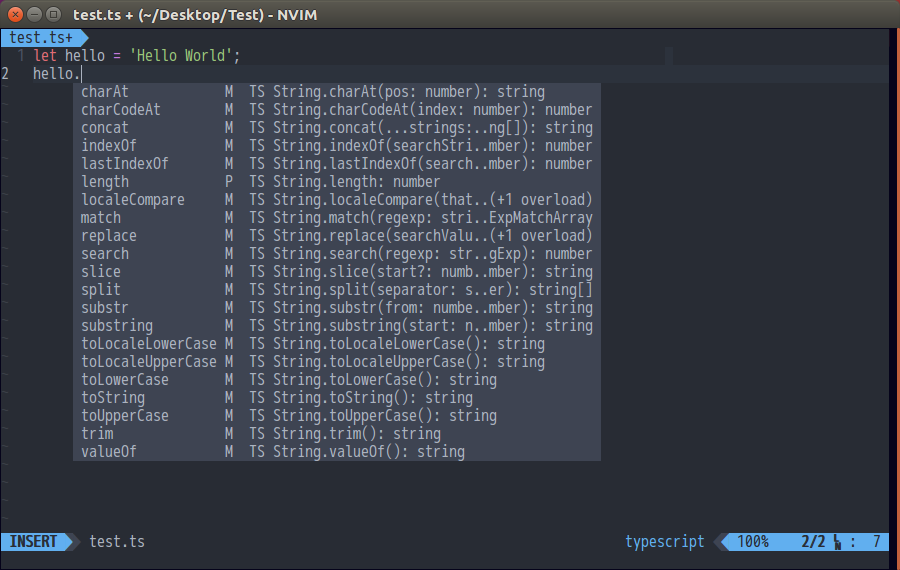
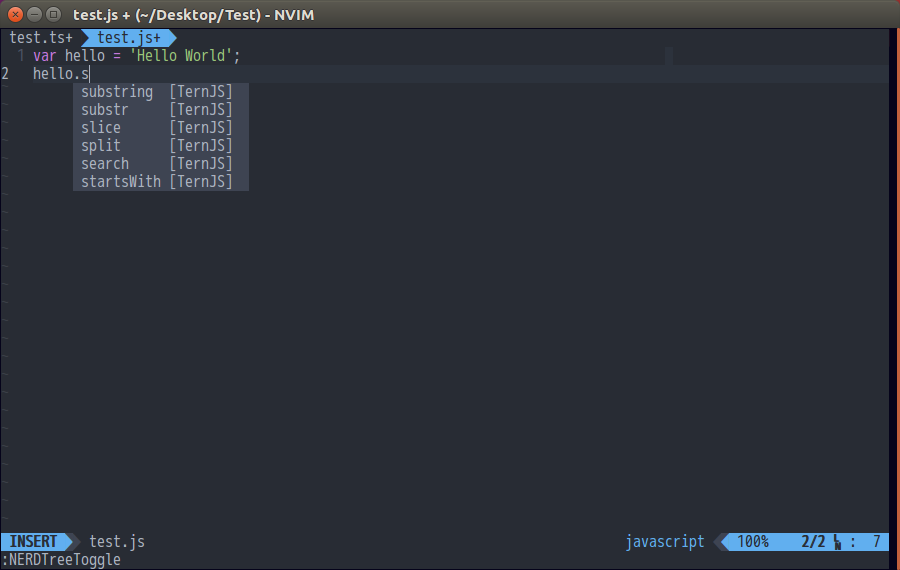
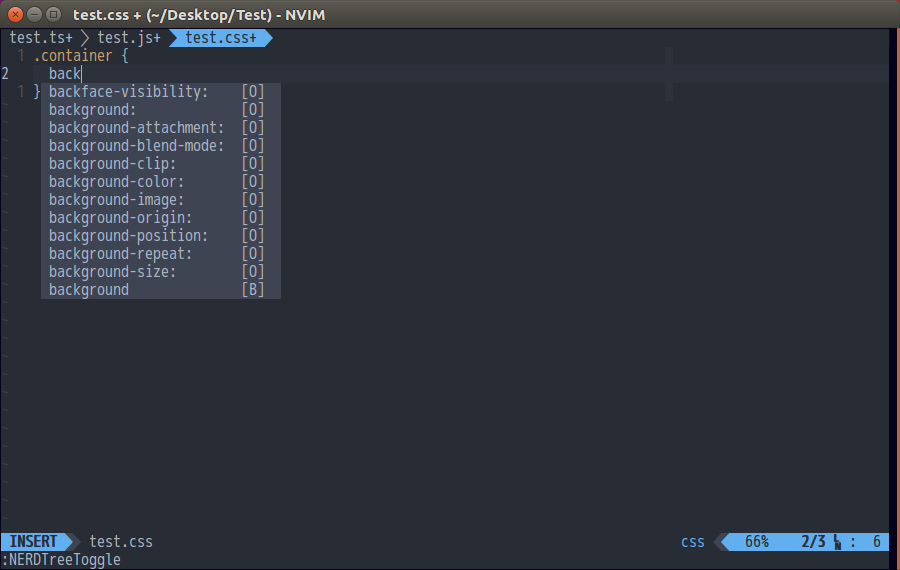
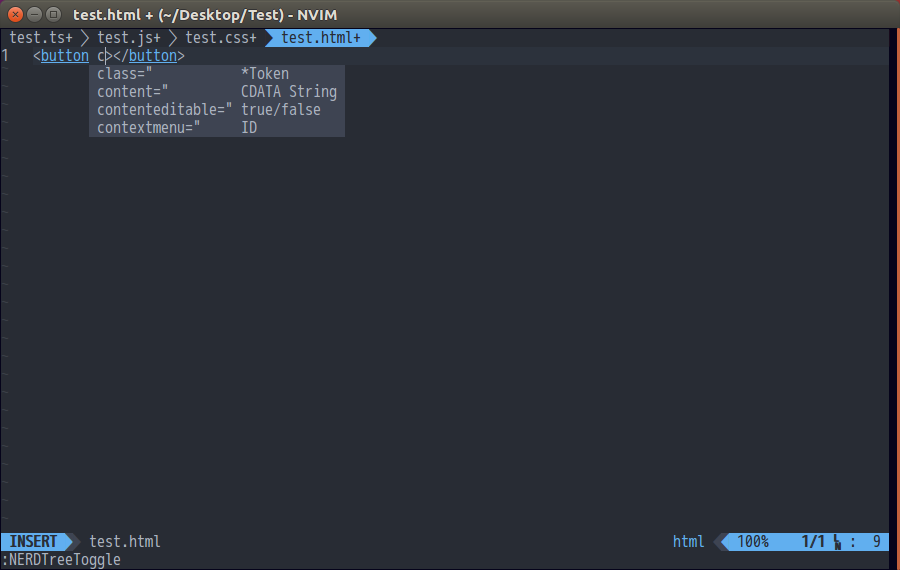
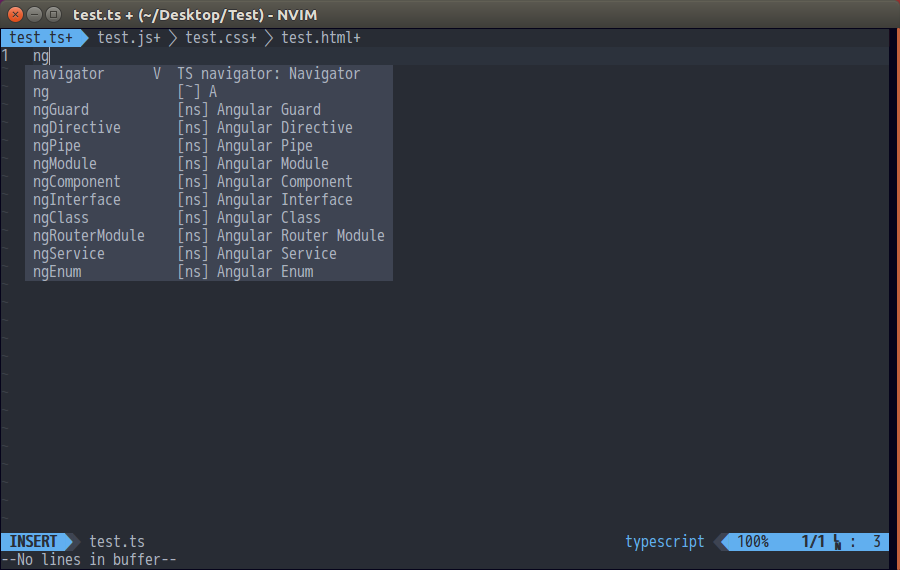
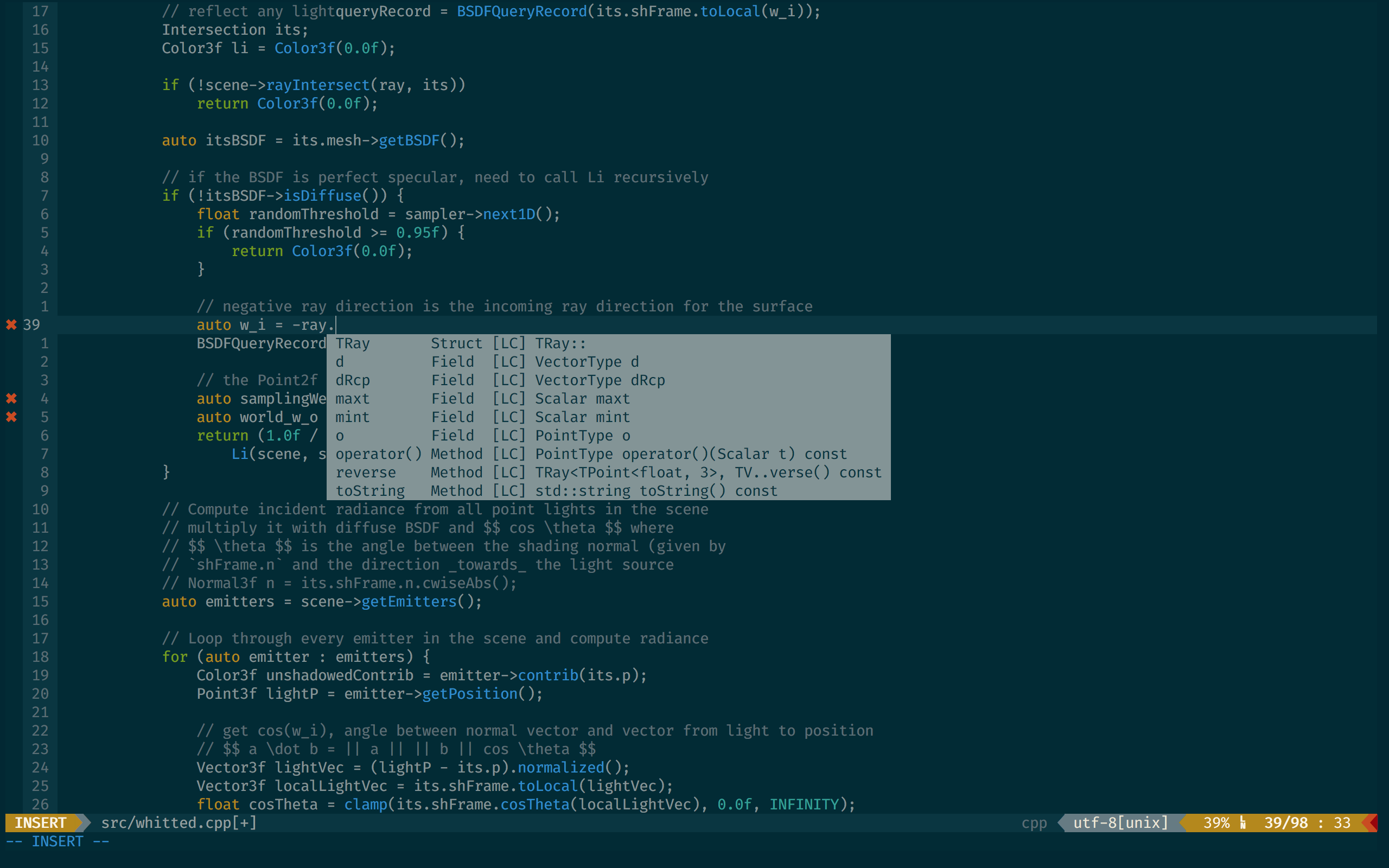
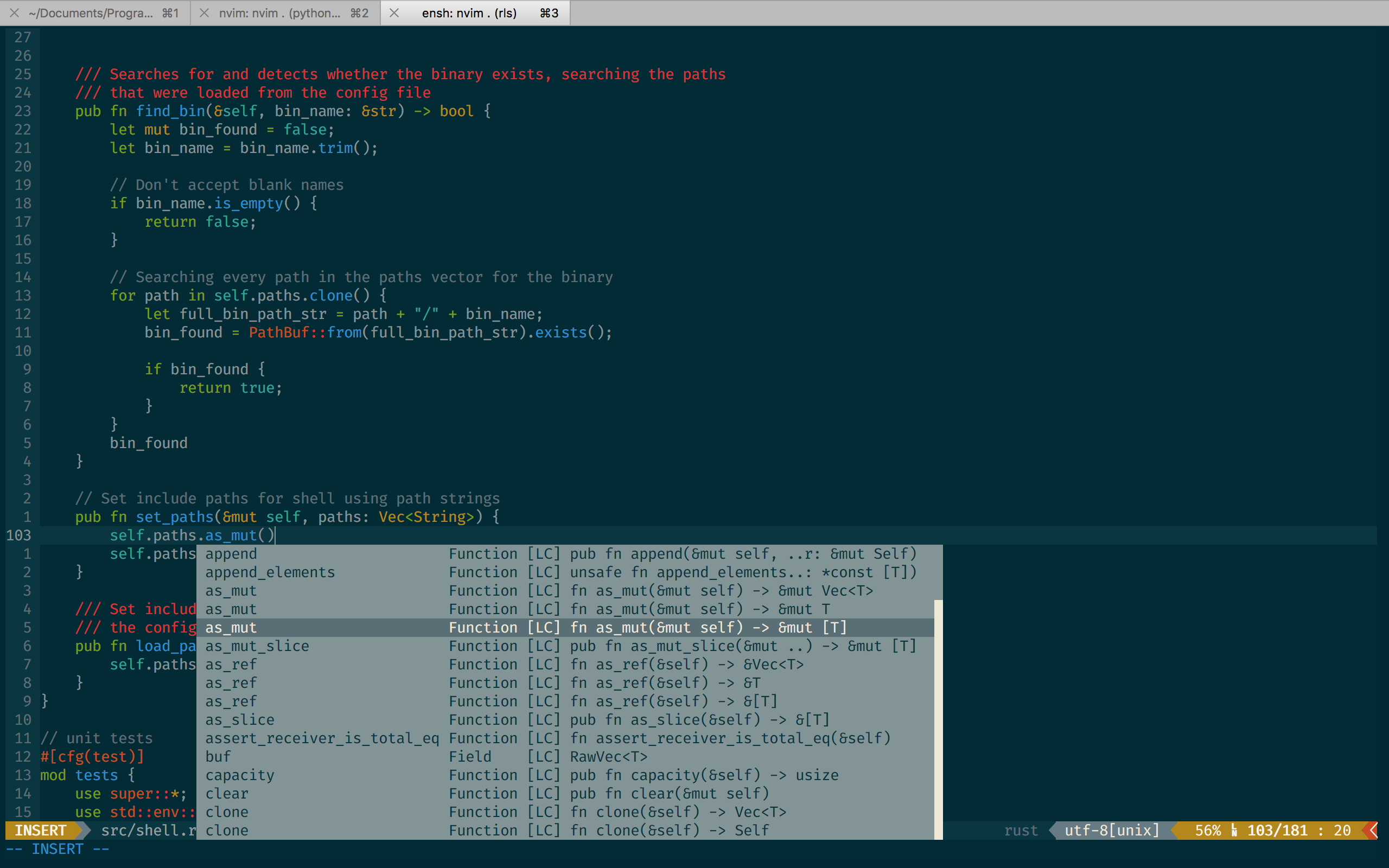


Top Related Projects
Nodejs extension host for vim & neovim, load extensions like VSCode and host language servers.
A completion plugin for neovim coded in Lua.
A code-completion engine for Vim
async language server protocol plugin for vim and neovim
Convert  designs to code with AI
designs to code with AI

Introducing Visual Copilot: A new AI model to turn Figma designs to high quality code using your components.
Try Visual Copilot